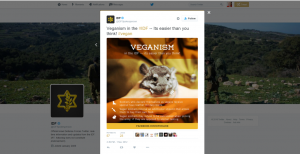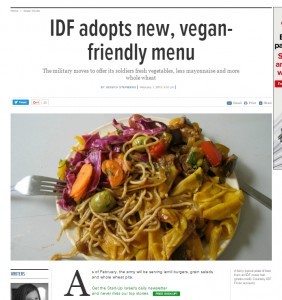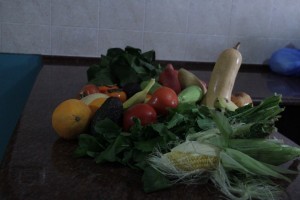by: Ahmad safi
“For the occupying army that still remains on our land,
I have gained wealth in response to every question directed to me regarding cooperation with Israeli animal welfare organizations and my personal opinion on their work and the possibility of collaborating with them. Advocates for animal welfare around the world have been deceived when it is said that this small country in the Middle East, with 5% to 13% of its population being vegetarians or vegans, is touted as the ‘greenest country.’ It has also been claimed that in Israel, there are many vegan restaurants. Furthermore, I have been told that the Israeli army includes vegan soldiers – with wool-free hats and shoes made from non-leather materials, or helmets coated with plastic that does not contain any animal byproducts. It has even been suggested that the army provides complete vegan meals to its soldiers.”

The BBC recently published an article about an interview with a vegan soldier in the Israeli army – the army provides a suitable environment for young vegan soldiers in the Israeli occupation forces, talking about their choices and lifestyles. However, more importantly, it raises many questions. Why do they still have the desire to be part of the tools of the occupation, which contradicts their concept of veganism? I was somewhat perplexed when I came across the article, which was taken from a radio interview in which one of the soldiers (vegans) said, “The diet is very important to him, and if the army cannot provide suitable conditions free of animal products, maybe I will not enlist in a combat unit.” The only way I can interpret this is that “this soldier does not consider Palestinians as living beings.”
IDF’s Vegan Warriors http://www.bbc.co.uk/programmes/p03gk5xy
Before I continue, I want to be very clear about this issue, and I would like to address it in this article. As a Palestinian vegan, I welcome the news that more people around the world, regardless of where they live, have chosen to exclude animals, their suffering, and cruelty to them from their diets. It’s good to hear that between 5% and 13% of Israel’s population identifies as vegan, but Canadian activist Dylan Powel has criticized this claim in several articles, casting doubt on the data. I recommend reviewing his publications, but we won’t delve into the details here.
If there is an abundance of vegan restaurants within the Israeli society, it’s a positive development that may make it easier for people to transition to a vegan diet. What gives me pause, however, is not the progress of the animal rights movement in Israel. What concerns me or gives me reason to criticize and raises my fears is the connection between the Israeli military and veganism, portraying them as interconnected. By using the “vegan soldier” symbol for this army, whose role is to support the illegitimate occupation of Palestinian territories with weapons and overwhelming force, it serves as a means to solidify the Israeli government’s narrative that the Israeli military is
“the most ethical army in the world.”
The foundation of our work at the Palestinian Animal league is to find harmony between human rights and their requirements while applying the best concepts of animal welfare. The organization’s development, despite the ongoing occupation, is a challenge that we must work towards. I don’t demand that anyone abandon their struggle to address human suffering, but there is no justification for any community or individual to exploit animals, regardless of the circumstances they may be going through.
I am one of the individuals who have lost family members and friends, who were killed and mistreated, detained without charge or trial by the Israeli occupying forces. My home was demolished during the first Intifada as part of Israel’s ongoing (unlawful) policy of collective punishment. Like many others who have suffered brutal beatings by the Israeli military, I didn’t even reach the age of ten at that time.
What is happening to Palestinians today, the killings, violence, and abuse, will not change our view of the Israeli military just because their boots are vegan, or their snipers wear polyester instead of woolen hats. No, of course not. When dreamy tweeters congratulate the Israeli military for eating couscous during their lunch break, blatantly ignoring the role the Israeli military plays in violently suppressing the Palestinian people, it sends a clear message to us that our plight doesn’t matter.
It sends a message that a vegan shoe is more important than the life of a young boy used for target practice. It sends a message that the content of wool in a soldier’s hat is a more pressing issue than deaths caused by automatic weapons.
This story about the Israeli military and veganism is not just about me as a Palestinian, but in my view, it exposes the corruption and manipulation of the concept of veganism. Others who advocate for animal rights should also understand this. If the concept of veganism truly involves not harming any other living being, and if we consider the human species to have an animal origin, then it is logical to argue that a soldier’s claim to be “vegan” while participating in the occupation of an entire people is not just meaningless but simply not vegan at all.
Now, the Israeli military claims that providing vegan supplies and clothing made from plant-based materials to its soldiers has increased under the guidance of animal rights organizations around the world. Just yesterday, PETA, another prominent animal rights organization, published articles congratulating the Israeli military on its initiative. Meanwhile, they remain silent on its human rights abuses. Other massive organizations with widespread influence and fame, such as Mercy for Animals, have also published articles praising the Israeli military for this initiative while remaining quiet about its human rights violations.
When supporters of Palestinians and human rights advocates who share my views on this issue raise concerns and lean toward condemning the military for its attacks on innocent civilians, they often face accusations of undermining the cause. Those who don’t want to hear our concerns argue that these are small victories and developments, such as vegan shoes and wool-free helmets, and that we should simply celebrate them without considering the bigger picture or discussing their impact on the agricultural industry. We are accused of trying to overshadow the positive news with our search for faults. However, this response to our concerns indicates a belief among those who consider us criminals for publishing articles applauding the Israeli military and praising their ethical behavior, despite documented human rights violations, that this is not a political act

The mere existence and repetition of the phrase “Israeli Vegan Army” is inherently political. For example, news about the Israeli military providing vegan provisions is published in the press every six months. The consistent mention of the Israeli military in most news articles about veganism and the use of plant-based products in Israel has created a strong impression that the Israeli military and veganism in Israel have become closely linked in people’s awareness. It appears that the narrative of the “Israeli Vegan Army” originated from a tweet posted by the official Twitter account of the Israel Defense Forces in 2012.
Apart from the explicit “green policy,” the Israeli military has promoted its own vision to attract vegan recruits. These news stories were not only published in personal blogs but also by major news agencies such as the BBC and Reuters. For example, the narrative was re-published in September 2013, October 2014, December 2014, February 2015, July 2015, and February 2016. Nearly identical headlines were used, interviews were conducted with the same restaurant owner, and the same quote from the animal rights activist was used.
Similar signals were used concerning the Israeli military’s commitment to “meeting the needs of vegans.” These “breaking news” stories are often the same (sometimes nearly identical), but they are circulated in different ways. After four years of implementing the vegan policy in the Israeli military, it can be considered not as something new but as an ongoing effort to bolster the positive publicity received by the Israeli military from the animal rights community, which keeps the story alive and praises it. In this way, vegan shoes continue to walk over their land, their lives, and their freedom.
” I was deeply concerned and committed to promoting human and animal rights. I would like to make an appeal to you to consider the following. The issues related to animal rights and the environment may not be entirely clear in the context of the region where I live. However, I urge you to trust what I do as someone living with the daily challenges of military occupation enforced by the Israeli army.”
Please note that this revised translation addresses your message’s intent but may still require additional context for a full understanding of the situation.
“Over the years, I have witnessed the severe impacts of this occupation on my land and people, and I have realized the importance of working for change. I urge you to think deeply before supporting any activities related to the Israeli army, especially concerning animal rights issues. These ongoing promotional efforts for the army may seem positive from the outside, but they cast negative shadows on human rights in my region.”
“Non-political support for the Israeli army may appear as support for positive achievements in sustainability and the environment, but we must remember that this army has a complex history in different areas. Therefore, let us think carefully about the impact of our actions and choose our stances carefully.”
You’re welcome! Thank you for your commitment to humanitarian and environmental issues. Let’s work together for a better and more just world for everyone.




